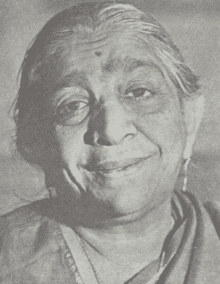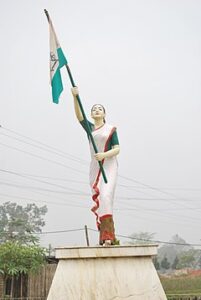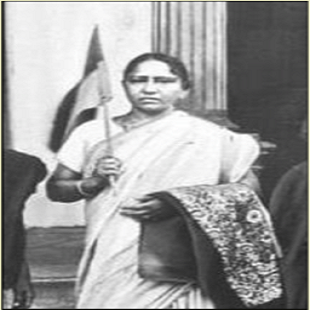
As history’s pages unfold, we are often regaled with tales of well-known men who led India’s valiant struggle for independence. However, behind the scenes and often overshadowed, a cohort of remarkable women dedicated their lives to the cause with equal enthusiasm and courage. These lesser-known heroines, often lost in the annals of time, played pivotal roles in shaping the destiny of a nation.
Instagram | Facebook | Youtube | Podcast |
In this blog post, we embark on a journey of discovery to illuminate the lives and contributions of these unsung warriors who defied societal norms, braved adversity, and left an indelible mark on India’s fight for freedom. Join me to explore the extraordinary stories of these women whose unwavering determination and sacrifices have earned them a rightful place in the chronicles of India’s struggle for independence.
Sarojini Naidu

Sarojini Naidu, known as the “Nightingale of India,” was a distinguished poet, prominent freedom fighter, and influential political leader during India’s struggle for independence. Her eloquent poetry, such as “In the Bazaars of Hyderabad,” stirred nationalistic fervour and celebrated India’s cultural heritage. Naidu played a vital role in the Indian National Congress, advocating for civil disobedience and non-cooperation. She actively participated in movements like the Salt Satyagraha and represented India on the international stage, contributing to diplomatic efforts. Naidu’s commitment to women’s empowerment, her distinction as the first Indian woman to preside over the Congress session, and her multifaceted contributions continue to inspire generations seeking justice, equality, and freedom. Instagram | Facebook | Youtube | Podcast |
Neera Arya

Neera Arya, an unsung heroine of the Indian National Army (INA), exemplified the countless nameless freedom fighters who sacrificed for India’s independence. Born on March 5, 1902, in Khekra, Uttar Pradesh, Neera Arya’s patriotism was evident from a young age, as she actively participated in freedom movements during British rule.
Married to a British investigation officer, Shrikant Jairanjan Das, conflict arose due to their differing loyalties. Neera’s deep love for the nation led her to join the Jhansi Regiment under Netaji Subhash Chandra Bose’s Azad Hind Fauj, which was committed to the freedom struggle.
Neera’s commitment was put to the ultimate test when her husband, ordered to spy on and assassinate Bose, attempted to harm him. Faced with a life-changing decision, Neera courageously chose the nation over her family, saving Bose’s life by sacrificing her husband’s. She was subsequently imprisoned and subjected to relentless torture, even enduring the loss of her breasts for refusing to divulge information about Bose.
Despite unimaginable suffering, Neera Arya remained steadfastly loyal. Her unwavering dedication earned her the distinction of being the INA’s first woman spy. After India gained independence, she was released from jail and spent her remaining years in Hyderabad, passing away in 1998.
Decades later, Kannada film director Roopa Iyer is bringing Neera Arya’s heroic story to the forefront through a biopic, ensuring that her remarkable contribution to India’s struggle for freedom is remembered and celebrated by generations to come.
Bi Amma

Amid India’s arduous struggle for freedom, a lesser-known but remarkable figure emerged – Abadi Bano Begum, affectionately known as Bi Amma. While countless freedom fighters remained unsung, Bi Amma’s contribution to the cause stood out, making her a trailblazer for Muslim women’s involvement in the movement.
Instagram | Facebook | Youtube | Podcast |
Born in 1852 in the United Province, Bi Amma hailed from a nationalist family with a legacy of participation in the 1857 revolt against British rule. Married to Abdul Ali Khan, she faced adversity after his death, becoming a widow with six children. Her determination to provide her children with modern education led her to sell her jewellery, ensuring they attended English medium schools.
Bi Amma’s sons, Maulana Mohammed Ali Jouhar and Maulana Shaukat Ali excelled academically and later played pivotal roles in the Khilafat Movement. During this movement, which aimed to support Turkey’s Caliphate against British interests, Bi Amma defied purdah norms, urging women to participate actively.
With her sons and Mahatma Gandhi imprisoned, Bi Amma assumed a prominent role, travelling extensively to propagate the message of freedom. She rallied Indian women, emphasizing the importance of Khadi and Swadeshi, encouraging them to support the Tilak Swaraj Fund. Despite being illiterate, her wisdom and spirituality earned her respect.
Bi Amma’s advocacy for Hindu-Muslim unity highlighted her vision of a united India. Her legacy lives on, an embodiment of strength and resilience during a critical juncture in Indian history. Recognizing her often-overlooked contributions, her story must be shared widely, teaching future generations about her role in shaping the nation’s struggle for freedom.
Instagram | Facebook | Youtube | Podcast |
Matangini Hazra:

Fondly known as Gandhi Buri, Matangini Hazra was a fearless freedom fighter who left an indelible mark during India’s struggle for independence. A prominent figure in the Quit India Movement and Non-Cooperation Movement, she displayed unwavering courage and dedication to the cause. During a pivotal procession, Matangini Hazra continued to lead even after being shot thrice, defiantly waving the Indian flag and chanting “Vande Mataram.” Her unyielding spirit and determination were so remarkable that she earned the distinction of being the first woman in Kolkata, Independent India, to have a statue erected in her honour in 1977. Notably, Hazra Road in Kolkata is also named after her, serving as a reminder of her valiant contributions to the nation’s struggle for freedom.
Kanaklata Barua:

Known by the affectionate moniker Birbala, Kanaklata Barua emerged as a courageous Indian freedom fighter hailing from Assam. Her resolute commitment to the Quit India Movement in 1942 at Barangabari showcased her unwavering determination. At just 18 years old, she fearlessly led a line of women volunteers with the National Flag in hand, intending to hoist it at the British-dominated Gohpur Police Station. Tragically, her noble aspirations were met with force, as British authorities prevented her from carrying out her mission. Despite facing adversity, Kanaklata Barua’s spirit remained unbroken. Alongside several other picketers, she was shot by the British police, sacrificing her life for her country. Kanaklata Barua’s remarkable bravery at such a young age serves as an enduring symbol of the sacrifices made by women in India’s struggle for independence.
Instagram | Facebook | Youtube | Podcast |
Tara Rani Srivastava

Born into a modest family in Saran, Bihar, Tara Rani Srivastava’s unwavering commitment to India’s freedom struggle marked her as a remarkable figure. She became an active participant in the Quit India Movement of Gandhi in 1942, alongside her husband Phulendu Babu. The couple’s determination led them to plan a daring act: raising the Indian flag atop the Siwan Police Station. Despite facing grave danger, they gathered a determined crowd, marching towards the station while chanting ‘Inquilab’ (Revolution). Tragedy struck when the police opened fire, injuring Phulendu. Undaunted, Tara Rani Srivastava tended to her wounded husband and pressed forward, leading the crowd with the Indian flag held high. Although her husband did not survive, Tara Rani continued to champion the cause, embodying resilience and dedication in the face of adversity. Her unwavering spirit serves as a testament to the bravery of countless women who fought for India’s independence.
Bikaji Cama

A notable personality in the Indian Nationalist Movement, Bikaji Cama, born Bhikaiji Rustom Cama in 1861, emerged as a prominent freedom fighter. Hailing from a Parsi family in Bombay (now Mumbai), she was an advocate for equality between men and women. Notably, she selflessly donated her assets to support a girls’ orphanage. Cama’s active involvement extended beyond India’s borders – in 1907, she travelled to Germany as an Indian ambassador, where she famously hoisted the Indian National flag as a symbol of resistance against British colonial rule. Despite her physical absence, her actions continued to inspire the fight for India’s independence. Her contributions, both within India and on the international stage, serve as a testament to her enduring dedication to the cause of freedom.
Aruna Asaf Ali

Revered as ‘The Grand Old Lady’ of the Independence Movement, Aruna Asaf Ali was a distinguished Indian freedom fighter and activist. She achieved iconic status for her audacious act of hoisting the Indian National Congress flag during the Quit India Movement at the Gowalia Tank Maidan in Bombay. A resolute participant in the Salt Satyagraha and various protest marches, Aruna Asaf Ali fearlessly confronted British authorities and endured imprisonment for her convictions. Notably, she organized political prisoners, advocating for improved conditions through a hunger strike. Her leadership and sacrifice left an indelible mark on India’s struggle for freedom, and her legacy continues to inspire generations to uphold the values of justice, equality, and liberty.
Instagram | Facebook | Youtube | Podcast |
As we conclude this tribute to the lesser-known heroines of India’s independence struggle, let their stories echo as a reminder that history’s tapestry is woven not only with grand gestures but also with the countless unsung sacrifices of determined women. Their unwavering commitment, often in the face of adversity, serves as an inspiration for generations to come. Let us honour their legacy by ensuring that these remarkable women, who shaped the destiny of a nation, are forever etched in our collective memory.
Jai Hind!
Neerja Bhatnagar
Let us connect on Instagram | Facebook | Youtube | Podcast |
